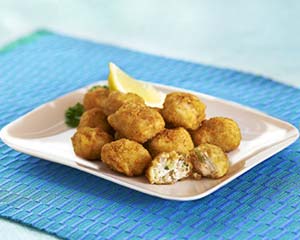There’s no need for clam chowder lovers to worry anymore about stains on shirts or neckties from the slip of a spoon or the drip of a sip from one’s lip. Now it’s perfectly fine to eat a new version of the New England classic menu pleaser with your fingers, thanks to the folks SeaWatch International.
The Easton, Maryland, USA-headquartered company dished out creamier Sea Watch Deep Fried Clam Chowda in nugget form during the recently held Seafood Expo North America in Boston. And the line of show-goers seeking samples was long and constant during the three-day trade fair.
“We have formed a creamy chowder center and coated it in panko crumb and fried it,” said Tracey Hallbauer, marketing manager. “It’s great as an appetizer, entrée or buffet item.”
 Distributed frozen in five-pound packs, the count is 20 to 25 pieces per pound and the portion cost for foodservice operators is currently 27-cents apiece [based on the January 15, 2017 price list].
Distributed frozen in five-pound packs, the count is 20 to 25 pieces per pound and the portion cost for foodservice operators is currently 27-cents apiece [based on the January 15, 2017 price list].
Also introduced during the Boston show was a new range of frozen soups including New England Clam Chowder, Clam Chili and Mediterranean Clam Soup.
In addition to clam products, the company’s value-added frozen seafood line includes crab cakes, breaded calamari and tempura shrimp.
Based in the Chesapeake Bay region of Maryland, SeaWatch is the largest harvester and processor of surf and ocean clam products in the nation. Most of its name brand items, which range from frozen clam strips and stuffed clams to clam sauces, are distributed to industrial and foodervice customers – including the majority of the leading chain restaurants in North America. Recently, SeaWatch began working with Bar Harbor Seafoods to penetrate the retail sector.
The company was founded in 1978 in Milford, Delaware. All of its clams are harvested in federally regulated US waters, where it enjoys the largest offshore clam allocation in the industry. SeaWatch operates 30 vessels and four state-of-the-art processing plants in Maryland, Delaware, Virginia and Massachusetts.





